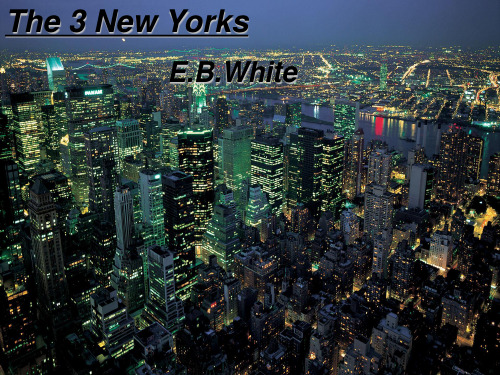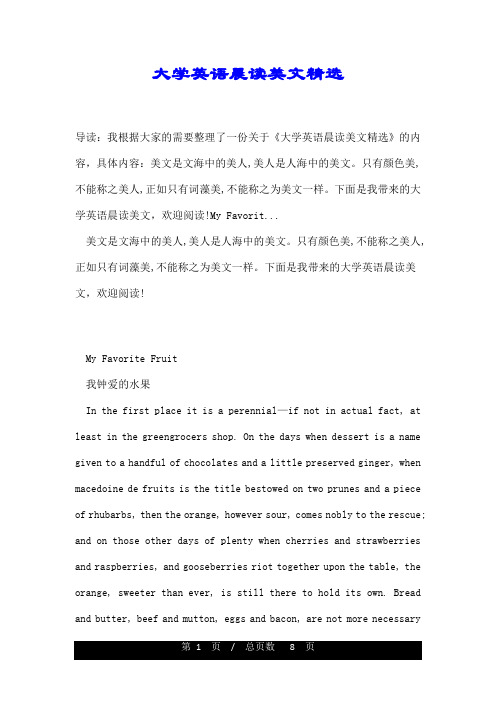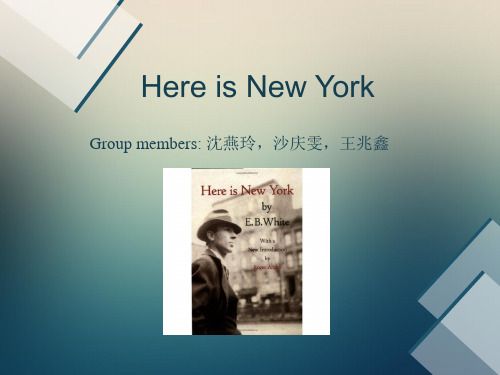The Three New Yorks三个纽约
- 格式:doc
- 大小:31.50 KB
- 文档页数:3



美国纽约市英语简介纽约(New York),是纽约都会区的核心,也是美国最大城市,同时也是世界最大的城市之一。
纽约位于美国东海岸的东北部,是美国人口最多的城市,也是个多族裔聚居的多元化城市,拥有来自97个国家和地区的移民,在此使用的语言达到800种。
截至2014年,纽约大约有849万人,居住在789平方千米的土地上。
纽约市是一座世界级国际化大都市,直接影响着全球的经济、金融、媒体、政治、教育、娱乐与时尚界。
纽约GDP于2013年超越东京,位居世界第一。
下面店铺为大家带来旅游英语美国纽约市英语简介,欢迎大家阅读!纽约市英语简介:New York City is the most beguiling place there is. You may not think so at first - for the city is admittedly mad, the epitome in many ways of all that is wrong in modern America. But spend even a week here and it happens - the pace, the adrenaline take hold, and the shock gives way to myth. Walking through the city streets is an experience, the buildings like icons to the modern age, and above all to the power of money. Despite all the hype, the movie-image sentimentalism, Manhattan - the central island and the city's real core - has massive romance: whether it's the flickering lights of the midtown skyscrapers as you speed across the Queensboro bridge, the 4am half-life in Greenwich Village, or just wasting the morning on the Staten Island ferry, you really would have to be made of stone not to be moved by it all.None of which is to suggest that New York is a conventionally pleasing city. Take a walk in Manhattan beside Central Park, notably its east side, past the city's richest apartments and best museums, and keep walking: within a dozen or so blocks you find yourself in the lower reaches of Spanish Harlem. The shock could hardly be more extreme. The city is constantly like this, withglaring, in-your-face wealth juxtaposed with urban problems - poverty, the drug trade, homelessness - that have a predictably high profile. Things have definitely changed during the nineties, especially in the recent, Mayor Guiliani years. Crime figures are at their lowest in years and are still dropping (statistically, New York is now one of the country's safest big cities), and renewal plans have finally begun to undo years of urban neglect. But for all its new clean-cut image New York remains a unique place –one you'll want to return to again and again.The city also has more straightforward pleasures. There are the different ethnic neighborhoods of Lower Manhattan, from Chinatown to the Jewish Lower East Side and ever diminishing Little Italy; and the artsy concentrations in SoHo, TriBeCa, and the East and West Village. There is the architecture of corporate Manhattan and the more residential Upper East and West Side districts (the whole city reads like an illustrated history of modern design); and there is the art, which affords weeks of wandering in the Metropolitan and Modern Art Museums and countless smaller collections. You can eat anything, at any time, cooked in any style; drink in any kind of company; sit through any number of obscure movies. The established arts - dance, theater, music - are superbly catered for, and although the contemporary music scene is perhaps not as vital or original as in, say, London or Los Angeles, New York's clubs are varied and exciting, if rarely inexpensive. And for the avid consumer, the choice of shops is vast, almost numbingly exhaustive in this heartland of the great capitalist dream.。

大学英语晨读美文精选导读:我根据大家的需要整理了一份关于《大学英语晨读美文精选》的内容,具体内容:美文是文海中的美人,美人是人海中的美文。
只有颜色美,不能称之美人,正如只有词藻美,不能称之为美文一样。
下面是我带来的大学英语晨读美文,欢迎阅读!My Favorit...美文是文海中的美人,美人是人海中的美文。
只有颜色美,不能称之美人,正如只有词藻美,不能称之为美文一样。
下面是我带来的大学英语晨读美文,欢迎阅读!My Favorite Fruit我钟爱的水果In the first place it is a perennial—if not in actual fact, at least in the greengrocers shop. On the days when dessert is a name given to a handful of chocolates and a little preserved ginger, when macedoine de fruits is the title bestowed on two prunes and a piece of rhubarbs, then the orange, however sour, comes nobly to the rescue; and on those other days of plenty when cherries and strawberries and raspberries, and gooseberries riot together upon the table, the orange, sweeter than ever, is still there to hold its own. Bread and butter, beef and mutton, eggs and bacon, are not more necessaryto an order existence than the orange.首先,柑橘常年都有——即使不是在树上,至少是在水果店里。


Unit 1Apology of SocratesLet us reflect and we shall see that there is great reason to hope that death is a good; for one of two things — either death is a state of nothingness and utter(完全的) unconsciousness, or, as men say, there is a change and migration of the soul from this world to another.Now if you suppose that there is no consciousness, but a sleep like the sleep of him who is undisturbed even by dreams, death will be an unspeakable gain. For if a person were to select the night in which his sleep was undisturbed by dreams, and were to compare with this the other days and nights of his life, and then were to tell us how many days and nights he had passed in the course of his life better and more pleasantly than this one, I think that any man, I will not say a private man, but even the great king will not find many such days and nights, when compared with the others.Now if death be of such a nature, I say that to die is a gain; for eternity is then only a single night. But if death is the journey to another place, and there, as men say, all the dead abide, what good, my friends and judges, can be greater than this?我们如果从另一角度来思考死亡,就会发觉有绝大理由相信死亡是件好事。
三种纽约人埃尔温·布鲁克斯·怀特纽约人大致可分为三种。
第一种是纽约本地人,他们天天耳濡目染这种城市,无论是它的大小,还是它的喧嚣,他们都习为常,视之当然。
第二种是通勤旅客——白日入城如蝗虫,夜晚回家喧嚣嚣。
第三种是异乡寻梦客。
在这三类骚动的纽约人中,最伟大的要数最后一类人,他们以纽约为最后的港湾,以纽约为自己的目的地。
正是异乡寻梦客让纽约充满了活力,让纽约充满了诗意,让纽约为艺术作出了贡献,让纽约取得了无与伦比的成就。
是通勤旅客让这座城市像潮汐一般躁动不安;是本地人让纽约显得具有整一性和持续性,而异乡客赋予纽约激情。
无论是来自意大利的,在贫民窟开铺卖杂货的农夫,还是来自密西西比小镇的,为了躲避邻居鄙视目光的年轻姑娘,即或是来自大农业区的,箱藏手稿而心中悲痛的小伙,这都没多大关系: each embraces New York with the intense excitement of first love, each absorbs New York with the fresh eyes of an adventurer, each generates heat and light to dwarf the Consolidated Edison Company.他们每个人都是带着初恋般的激动来拥抱纽约,他们每个人都以探险者崭新的眼光来接纳纽约,他们每个人都发出了自己的光和热,使得联合爱迪生公司也显得那样渺小。
三种纽约人埃尔温·布鲁克斯·怀特纽约人大致可分为三种。
第一种是纽约本地人,他们天天耳濡目染这种城市,无论是它的大小,还是它的喧嚣,他们都习为常,视之当然。
第二种是通勤旅客——白日入城如蝗虫,夜晚归家喧嚣嚣。
第三种是异乡寻梦客。
在这三类骚动的纽约人中,最伟大的要数最后一类人,他们以纽约为最后的港湾,为最后的归宿。
正是异乡寻梦客让纽约充满了活力,让纽约充满了诗意,让纽约为艺术作出了贡献,让纽约取得了无与伦比的成就。
Ex. 3 The three New Yorks (2)Elwyn Brooks WhiteThe commuter is the queerest bird of all. The suburb he inhabits has no essential vitality of its own and is a mere roost where he comes at day’s end to go to sleep. Except in rare cases, the man who lives in Mamaroneck or Little Neck or Teaneck, and works in New York, discovers nothing much about the city except the time of arrival and departure of train and buses, and the path to a quick lunch. He is desk-bound, and has never, idly roaming in the gloaming, stumbled suddenly on Belvedere Tower in the park, seen the ramparts rise sheer from the water of the pond, and the boys along the shore fishing for minnows, girls stretched out negligently on the shelves of the rocks; he has never come suddenly on anything at all in New York as a loiterer, because he had no time between trains. He has finished in Manhattan’s wallet and dug out coins, but has never listened to Manhattan’s breathing, never awakened to its morning, never dropped off to sleep in its night. About 400,000 men and women come charging onto to the Island each week-day morning, out of the mouths of tubes and tunnels. Not many among them have ever spent a drowsy afternoon in the great rustling oaken silence of the reading room of the Public Library, with the book elevator (like an old water wheel) spewing out books onto the trays. They tend their furnaces in Westchester and in Jersey, but have never seen the furnaces of the Bowery, the fires that burn in oil drums on zero winter nights. They may work in the financial district downtown and never see the extravagant plantings of Rockefeller Center—the daffodils and grape hyacinths and birches of the flags trimmed to the wind on the fine morning in spring. Or they may work in a midtown office and may let a whole year swing round without sighting Governor’s Island from the sea wall. The commuter dies with tremendous mileage to his credit, but he is no rover. His entrances and exits are more devious than those in a prairie-dog village; and he calmly plays bridge while his train is buried in the mud at the bottom of the East River. The Long Island Rail Road alone carried forty million commuters last year; but many of them were the same fellow retracing his steps.通勤者是所有人中最奇特的家伙。
The Three New YorksThere are roughly three New Yolks. There is, first, the New York of the man or woman who was born here, who takes the city for granted and accepts its size and its turbulence as natural and inevitable. Second, there is the New York of the commuter ---the city that is devoured by locusts each day and each night .Third, there is the New York of the person who was born somewhere else and came to New York in quest of something. Of these three trembling cities the greatest is the last—the city of final destination, the city that is a goal. It is this third city that accounts for New Yolk’s high-strung disposition, its poetical deportment, its dedication to the arts, and its incomparable achievements. Commuters give the city its tidal restlessness; natives give it solidity and continuity; but the settlers give it passion. And whether it is a farmer arriving from Italy to set up a small grocery store in a slum, or a young girl arriving from a small town in Mississippi to escape the indignity of being observed by her neighbors, or a boy arriving from the Corn Belt with a manuscript in his suitcase and a pain in his heart, it makes no difference; each embraces New Yolk with the intense excitement of first love, each absorbs New Yolk with the fresh eyes of an adventurer, each generates heat and light to dwarf the Consolidated Edison Company.The commuter is the queerest bird of all .The suburb he inhabits has no essential vitality of its own and is a mere roost where he comes at day’s end to go to sleep. Except in rare cases, the man who lives in Mamaroneck or Little Neck or Teaneck, and works in New Yolk, discovers nothing much about the city expect the time of arrival and departure of trains and buses, and the path to a quick lunch. He is desk-bound, and has never, idly roaming in the gloaming, stumbled suddenly on Belvedere Tower in the park, seen the ramparts rise sheer from the water of the pond, and the boys along the shore fishing for minnows, girls stretched out negligently on the shelves of the rocks; has never come suddenly on anything at all in New York as a loiterer, because he had no time between trains. He has finished in Manhattan’s wallet and drug out coins, but has never listened to Manhattan’s breathing, never awakened to its morning, never dropped off to sleep in its night. About 400,000 men and women come charging onto to the Island each week-day morning, out of the mouths of tubes and tunnels. Not many among them have ever spent a drowsy afternoon in the great rustling oaken silence of the reading room of the Public Library, with the book elevator (like an old water wheel) spewing out books onto the trays. They tend their furnaces in Westchester and in Jersey, but have never seen the furnaces of the Bowery, the fires that burn in oil drums on zero winter nights. They may work in the financial district downtown and never see the extravagant plantings of Rockefeller Center--- the daffodils and grape hyacinths and birches of the flags trimmed to the wind on a fine morning in spring. Or they may work in a midtown office and may let a whole year swing round without sighting Governor’s Island from the see wall. The commuter dies with tremendous mileage to his credit, but he is no rover. His entrances and exits are more devious than those in a prairie-dog village; and the calmly plays bridge while his train is buried in the mud at the bottom of the East River. The Long Island Rail Road alone carried forty million commuters last year; but many of them were the same fellow retracing his steps.The terrain of New York is such that a resident sometimes travels farther, in the end, than a commuter. The journey of the composer Irving Berlin from Cherry Street in the lowest East Side to an apartment uptown was through an alley and was only three or four miles in length; but it was like going three times around the world.三个纽约一般来说,纽约有三个。
第一个是土生土长的男女们的纽约城,他们把纽约的一切都看作是理所当然的,认为纽约的规模和喧嚣是很自然的、无法避免的。
第二个是每天往返城市间的人的纽约——城市被如同蝗虫一样的人群白天吞噬、夜晚吐出。
第三个是出生在他乡,到纽约来有所追求的人的纽约。
这三个骚动的纽约城中,最重要的是最后一个,这个城才是最终的目的地,才是要到达的终点。
正因为有了这第三个城,纽约才有它高度敏感的特性、诗人般的风度、对艺术的执着追求以及它无与伦比的成就。
上班族使纽约潮汐般没有片刻平静,本地人使纽约保持其稳定性和延续性,但外来谋生的人却激起了纽约的热情。
无论是从意大利来在贫民区开了个小杂货店的农民;还是为逃避邻居侮辱性目光从密西西比州小镇来的年轻姑娘;或是手提箱里装着手稿,内心痛苦地从玉米地带来的小伙子;大家都是一样:每个人都怀着初恋的激情来拥抱纽约,每个人都是以冒险家的新奇目光来审视纽约的,每个人散发的光和热都足以使爱迪生联合电气公司相形见绌。
上班族是所有人中最奇特的家伙。
他们居住的郊区没有最基本的生机,它仅仅是每天结束时回来睡觉的地方。
除个别情况外,那些住在马马罗内克,利特尔内克或蒂内克市,并且在纽约工作的人们,除了知道火车和汽车到达或离开的时间以及通往快餐店的路以外,对这座城市一无所知。